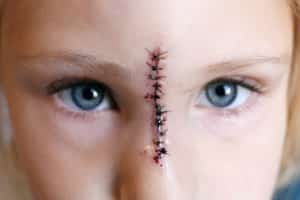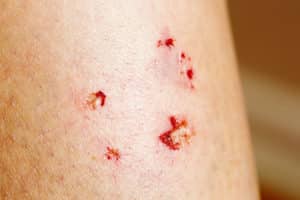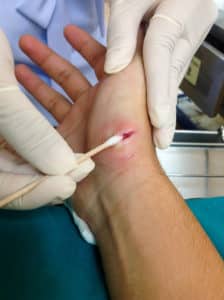What Happens if a Dog Bite Isn’t Treated?
Dog bite injuries come in many forms and the severity of your injuries will depend on a variety of factors, including the size of the dog and the region of your body damaged in the attack. While some injuries after a dog bite attack are visible immediately, others may take time to develop. For this reason, it’s critical to seek medical treatment immediately following the attack even if you don’t appear to be badly injured. Failure to receive prompt treatment can potentially lead to more serious consequences down the road and even impact the amount you can recover in a dog bite lawsuit.
What Are the Most Common Dog Bite Injuries?
 In general, children and adults tend to suffer different types of injuries in a dog bite attack. Children most often suffer severe injuries to their head and neck, most commonly in the form of lacerations. Due to the location of these injuries, it’s a good idea to have these lacerations treated by a plastic surgeon who can minimize the risk of facial disfigurement.
In general, children and adults tend to suffer different types of injuries in a dog bite attack. Children most often suffer severe injuries to their head and neck, most commonly in the form of lacerations. Due to the location of these injuries, it’s a good idea to have these lacerations treated by a plastic surgeon who can minimize the risk of facial disfigurement.
Since adults are typically better equipped to protect themselves during a dog bite attack, their injuries are most commonly on the arms and hands. While covering the face will help adults avoid facial lacerations and potential disfigurement, injuries to the hands are highly prone to infection since the soft tissue covering the bones and joints in this region is very thin.
How Long Does It Take to Develop an Infection After a Dog Bite?
The most common infection caused by a dog bite attack is Capnocytophaga. While it can take between 1-14 days after the dog bite for symptoms to develop, most individuals will begin to show signs of infection within 3-5 days. Common symptoms include:
- Blisters around the bite wound occurring several hours after the attack
- Fever
- Redness, swelling, draining pus or pain at the bite wound
- Vomiting
- Diarrhea and/or stomach pain
- Muscle or joint pain
- Headache
- Confusion
When not treated, Capnocytophaga can result in serious complications, including kidney failure, heart attack and gangrene. In severe cases, victims may need to have fingers, toes or limbs amputated due to these complications. In addition, when the infection progresses quickly, it can lead to sepsis and become fatal within 1-3 days after symptoms appear. In fact, about 30% of individuals who develop a severe Capnocytophaga infection die.
To prevent the development of an infection after a dog bite, wash the wound immediately with soap and water and then seek medical attention right away, even if you don’t feel sick. Prompt treatment is critical to ensuring your infection doesn’t become fatal.
Can I Develop an Infection if the Dog Bite Doesn’t Break the Skin?
 In general, the risk of infection is significantly lower if the dog bite doesn’t break the skin. However, only a small amount of contact is required for an infection develop, and research has found that even a slight scratch from a dog attack can result in infection. Therefore, you should always visit your doctor even if there is no blood and it doesn’t appear that the bite broke the skin.
In general, the risk of infection is significantly lower if the dog bite doesn’t break the skin. However, only a small amount of contact is required for an infection develop, and research has found that even a slight scratch from a dog attack can result in infection. Therefore, you should always visit your doctor even if there is no blood and it doesn’t appear that the bite broke the skin.
While the risk of infection is lower, you can still develop significant injuries when a dog bite doesn’t break the skin. It’s common to experience damage to tendons, ligaments and bones even when the bite appears relatively minor and doesn’t break the skin. In order to determine the extent of damage after an attack, you’ll need to be evaluated by a doctor.
Pain Can Also Develop Months After a Dog Bite
It’s common for individuals who don’t seek treatment after a dog bite to start experiencing pain months after the attack. Even if you’re able to return to work right away or resume all activities, you may find that you begin to develop pain, numbness and other symptoms at a later date. Common causes of delayed pain in the bite location may include:
- Nerve damage – A dog bite can puncture your nerves, resulting in debilitating pain that develops at a later date and can take months or years to fully recover from. In some instances, this nerve pain may be so severe that it impairs the ability to perform routine daily activities.
- Crush injuries – Very large dogs can easily crush small bones in your arms, wrists and hands during the attack. In some instances, you may not experience significant pain until later on when the broken bones don’t heal properly.
Always Seek Medical Treatment After a Dog Bite
 Due to the serious issues discussed above, it’s critical that you visit a doctor after a dog bite attack, even if you don’t have any visible signs of a serious injury. During your medical evaluation after a dog bite, your doctor will:
Due to the serious issues discussed above, it’s critical that you visit a doctor after a dog bite attack, even if you don’t have any visible signs of a serious injury. During your medical evaluation after a dog bite, your doctor will:
- Monitor your vital signs
- Assess your current level of pain
- Evaluate the injury location for signs of infection
- Test your range of motion
- Order any imaging necessary to identify potential injuries that aren’t readily visible
This assessment will ensure you receive the treatment you need right away, minimizing the risk of long-term issues or serious health consequences that may develop when a dog bite isn’t treated in a timely manner.
Will My Compensation Be Impacted if My Dog Bite Injury Isn’t Treated?
Colorado adheres to strict liability in dog bite cases. This means the dog owner is responsible for your injuries regardless of whether they acted negligently or knew their dog is prone to aggression. Therefore, you are still entitled to recover compensation for your dog bite injuries even if you don’t seek medical attention.
However, the value of your compensation may be impacted if you fail to have your injuries treated in a timely manner. Under Colorado’s comparative negligence laws, your compensation may be reduced by the percentage of negligence attributed to your actions. In a situation where your injuries were made more severe because you didn’t receive prompt treatment, you may potentially be found partially negligent, and you may potentially jeopardize your ability to recover the full compensation to which you’re entitled. To avoid this situation, always seek treatment as soon as possible following a dog bite attack.
Pushchak Law Can Help
If you’ve been injured in a dog bite attack in the Denver area, Pushchak Law can help ensure your rights are protected. Brian Pushchak has made dog bite cases a primary focus of his practice, and this specialization will give you the edge you need when seeking to maximize the value of your compensation.
You’ll benefit from Mr. Pushchak’s exclusive Informed Decisions Approach™ which is focused on helping you achieve the best possible outcome to your case. As part of this approach, Mr. Pushchak will provide the educational information necessary to ensure you understand your rights and options. He’ll listen carefully to you to understand your goals for your case in order to recommend the best strategy to achieve your desired outcome.
The extensive education Mr. Pushchak provides allows you to remain in control throughout the entire process. While he will recommend the best strategy to maximize your compensation, you will always have input on how your case is handled. This ensures we remain aligned with your best interests throughout the legal process.
Contact us today to schedule a free consultation. Pushchak Law serves clients in Denver and the surrounding areas of Colorado.
- How to Tell the Difference Between Dog Aggression and Playfulness - June 29, 2025
- How Motorcycle Accident Settlements Are Calculated - June 16, 2025
- What to Do After a Motorcycle Accident - June 11, 2025
Free Case Consultation
If you have been injured and would like to speak with one of our attorneys, take advantage of our free, no-obligation consultation. And if you have a viable case, there are no fees until we win.
Call 303.372.6145


